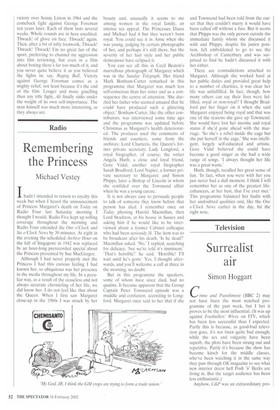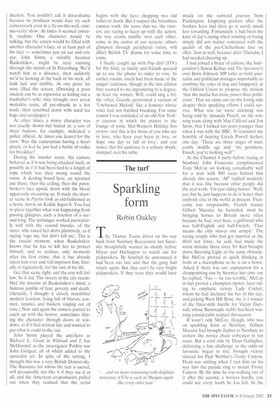Surrealist air
Simon Hoggart
Crime and Punishment (BBC 2) may not have been the roost watched programme of the past week, but I bet it proves to be the most influential. (It was up against Footballers Wives on ITV, which has been less successful than I expected. Partly this is because, as good-bad television goes, it's not been quite bad enough; while the sex and vulgarity have been superb, the plots have been strung out and repetitive. Partly it's because the show has become kitsch for the middle classes, who've been watching it in the same way they paw through OK magazine to see what new interior decor hell Posh 'n' Becks are living in. But the target audience has been less enthusiastic.)
Anyhow, C&P was an extraordinary pro duction. You couldn't call it docu-drama because no producer would dare try such camerawork even in a fly-on-the-wall, einema-verite show. At times it seemed entirely random. One character would be talking, but the screen would be filled with another character's face, or at least part of his face — sometimes just an ear and one eye. John Simm, a suitably haunted Raskolnikov, might be seen running through the streets of St Petersburg. We'd watch him at a distance, then suddenly we'd be looking at the back of his neck, all lank hair and stubble. At one point his nose filled the screen. (Dressing a poor student can be as expensive as kitting out a footballer's wife: they brought over seven moleskin coats, all pre-shrunk in a hot wash, then scrubbed down with used tea bags and sandpaper.) At other times, a minor character was not exactly shown but hinted at; a row of three buttons, for example, indicated a police official. At times you feared for the crew. Was the cameraman having a heart attack, or had he just had a bottle of vodka for breakfast?
During the murder scene, the camera behaved as if it was being attacked itself, or possibly as if it had been tied to a length of rope which was then swung round the room. A skirting board here, an upraised axe there, then the ceiling, then the pawnbroker's face upside down with the blood apparently streaming up. It made the shower scene in Psycho look as old-fashioned as a home movie on Kodak Super-8. You had to piece together what was happening from passing glimpses, each a fraction of a second long. The technique worked particularly well with the second murder, of the sister, who raised her skirts plaintively, as if saying 'rape me, but don't kill me'. This is the crucial moment, when Raskolnikov knows that he has to kill her to protect himself, and so realises, only moments after his first crime, that it has already taken him over and will imprison him, literally or figuratively, for the rest of his life.
Get that scene right, and the rest will follow. So it did. The streets of the city resembled the interior of Raskolnikov's mind, a hideous jumble of fear, poverty and death. (Actually, I thought it closely resembled modern London, being full of thieves, conmen, lunatics and buskers singing out of tune.) Now and again the camera panted to catch up with the horror, sometimes filming the character through doors or windows, as if it had arrived late and wanted to put what it could in the can.
John Simrn played the anti-hero as Richard E. Grant in Withnail and I, Ian McDiarmid as the investigator Porfiry was John Gielgud, all of which added to the surrealist air. In spite of the setting, I thought this was a very British Dostoevsky. The Russians, for whom the text is sacred, will presumably not like it if they see it at all, and the American co-producers pulled out when they realised that the serial begins with the hero chopping two old ladies to death. But I suspect the breathless camera work, the sense that we, the viewers, are racing to keep up with the action, the way events tumble over each other, some in the centre of our screens, others glimpsed through peripheral vision, will affect British TV drama for some time to come.
I finally caught up with Pop Idol (ITV) for the final, as family and friends queued up to use the phone in order to vote. In earlier rounds, much had been made of the judges' rudeness, though in the last edition they seemed to me ingratiating to a degree. At least the winner, Will, could sing a bit; the other, Gareth, performed a version of 'Unchained Melody' like a hamster whose voice had not finished breaking. For some reason I was reminded of an old New Yorker cartoon in which the pianist in the lounge of some Mid-Western Holiday Inn croons 'and this is for those of you who are in love, who have ever been in love, or hope one day to fall in love', and you notice that his audience is a solitary drunk, slumped over his table.





































































 Previous page
Previous page